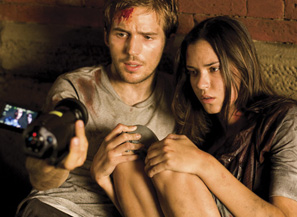What Went Right: Cloverfield
By Shalimar Sahota
August 9, 2012
Directed by Matt Reeves (though it appears as if his hands are being heavily guided by his producer), Cloverfield follows five survivors, Rob (Michael Stahl-David), his brother Jason (Mike Vogel), Jason’s girlfriend Lily (Jessica Lucas) and her friend Marlena (Lizzy Caplan). They are filmed by their friend Hud (T.J. Miller), who decides to document the attack that is happening because “people are gonna wanna know how it all went down.” As they attempt to leave the city, Rob receives a distressing voicemail from his girlfriend Beth (Odette Yustman) and risks his own life and those of his friends when he decides to rescue her.
Production was kept heavily under wraps. To prevent word from getting out, the cast members were not told anything about the story before shooting. Drew Goddard is credited as the writer, though it is believed that the cast did not even get to see his full script until midway through the production. This was apparently done to prevent the possibility of an Internet leak. Also, that the cast members were not A-list stars worked to the film’s advantage (a well known celebrity in this scenario told from the point of view of an everyman would be incredibly distracting). It also helped keep the cost down, for Cloverfield had a slim production budget of just $25 million. From watching it, you’d probably think it cost somewhere near twice that amount. With the exception of the end credits, the lack of any musical score also tightened the expenditure and even managed to make the few jump scares more frightening.
In reality, if Manhattan is turned into a full-scale war zone within a matter of minutes and your life is in serious danger, I doubt you would be so concerned about filming what’s happening around you. I say this and yet filming what was happening is exactly what a small minority of people did during the events of 9/11. Evoking memories of what happened on that fateful day, Cloverfield plays to those fears, with buildings crumbling, phones not working, even including a police officer telling people to keep moving. Also during the opening when the characters are on the rooftop, someone can be heard saying, “another terrorist attack.”
Cloverfield opened at the US box office on January 18, 2008. It reached the #1 spot with an opening weekend take of $40 million. After two days in release, it had already managed to recoup its production budget. Also, it still currently holds the record for the highest opening weekend in the month of January. Withholding information and keeping the monster out of sight in all the advertisements and trailers appeared to have worked. However, the film dropped a monumental 68% in its second week, falling to #4 with a take of $12.7 million. By week three it was down to #9, earning $4.8 million.
Its performance showed just how frontloaded the film was. Leading up to its release, the evasive marketing managed to get millions talking, generating a huge amount of buzz and causing many to speculate what would happen in the film. For anyone who was interested, it meant viewing the film as soon as possible. Once the “secret” was out (most likely the secret being that Cloverfield had no secret), the film just couldn’t hold. Reviews were mostly positive. It was described as better than that Roland Emmerich’s summer blockbuster Godzilla, yet having a critically derided film as Cloverfield’s closest buddy for comparison might have also contributed to its dramatic decline. Nevertheless it finished its run at the US box office with $80 million. Add in an overseas gross of $90.7 million and Cloverfield had earned $170.7 million worldwide. What makes the film a success is what it managed to achieve with such a low budget.
Continued:
1
2
3




